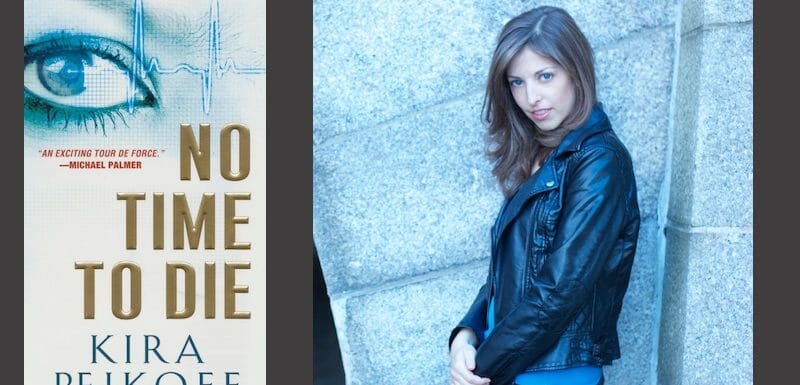 Imagine a world in which parents determine the genetic makeup of their unborn children. That’s the world Kira Peikoff, the author of “No Time to Die,” writes about. Peikoff’s novel is a bioethics thriller in which the science of aging is brought front and center. Currently attending Columbia University’s Master of Science program in Bioethics, Peikoff said she wants to encourage discussion about this hot-button issue by exposing readers to the not-too-distant future through her fiction.
Imagine a world in which parents determine the genetic makeup of their unborn children. That’s the world Kira Peikoff, the author of “No Time to Die,” writes about. Peikoff’s novel is a bioethics thriller in which the science of aging is brought front and center. Currently attending Columbia University’s Master of Science program in Bioethics, Peikoff said she wants to encourage discussion about this hot-button issue by exposing readers to the not-too-distant future through her fiction.
“I am addressing a couple of issues that fall under the realm of bioethics,” said Peikoff. Those issues are whether scientific interventions to slow down the natural aging process should be condemned or supported and whether scientific research should be subjected to less oversight so as not to restrict progress. Peikoff added that she sees these topics as complex with many subtle complications.
“In fiction,” said Peikoff, “you can only do so much to tackle the issues without distracting from the point—the story. So I just hope to provoke some thought and debate, and leave readers to come to their own conclusions.” One problem Peikoff faces is that many people see science as very abstract. “It’s actually extremely relevant, because your life could literally depend on the next medicine or treatment to come out of a lab. I hope to inspire respect for the researchers and doctors who toil in relative obscurity in order to make our lives better.”
The idea for “No Time to Die,” Peikoff’s second novel, came to her after she saw a documentary about a teenage girl who had inexplicably stopped aging as a toddler. “I couldn’t stop thinking about what life would be like for someone like that. Everyone wants to be young, but it would also be a tremendous curse not to age. I was also fascinated by the real-life medical mystery aspect of the case, which still has not been solved, though scientists believe the answer lies in some as-yet-unidentified sliver of DNA. The research remains ongoing.”
Details of genetic research are certainly not normal dinner-table conversation for most readers. This was an issue Peikoff knew she must deal with. “My biggest challenge in writing the book was trying to recreate the science in a way that paid homage to the real research going on today. I didn’t want to do a disservice to the scientists or my readers by totally fudging it, but when I started the book, I had truly no plan for how to tackle those all-important parts of the story.”
Although she only included research details when they were essential to the story, Peikoff wanted to get her facts correct. To do that, she emailed a well-respected researcher, Dr. Richard Walker. She said, “A few days later I got an email from him telling me that for the first time in human history, we are ‘close to unraveling the mystery of why we age and die.’ That email set off a professional correspondence that continues to this day. I am deeply grateful to have had his expert advisement with the nitty gritty details in my book.”
The world in which we live is changing rapidly. Terms such as personal genomics, 3D organ printing, and DNA sequencing, which once seemed foreign to all of us, are becoming the subject of mainstream conversation. Peikoff, who is studying for her Master’s in Bioethics at Columbia University, said, “Major advances in personal genomics are headed our way, given how dramatically cheap the price of DNA sequencing has become.
“In the future, we should be able to have our genome sequenced and told our disease risks in a much more accurate manner than today, so we’ll be able to take greater control over our health. Babies will be born with their entire genomes known in advance. Organs will be routinely printed, obviating the need for transplants. People may be able to genetically enhance themselves or their kids.” This may be a world few of us feel ready to deal with, yet it’s one we can experience now in “No Time to Die.”
More information
Learn more about Kira Peikoff on her website at www.kirapeikoff.com.

